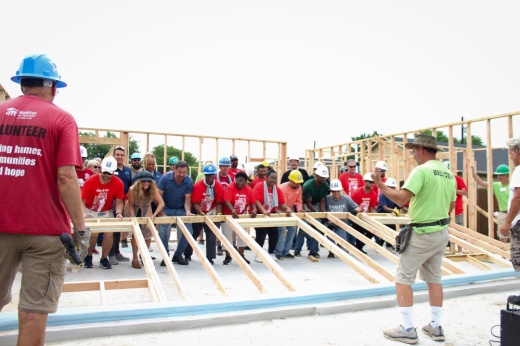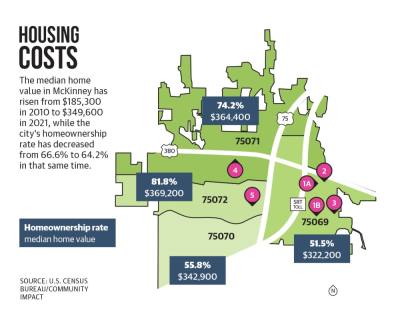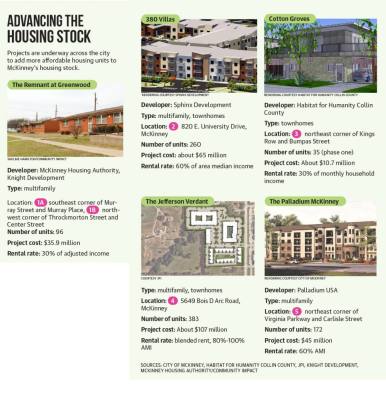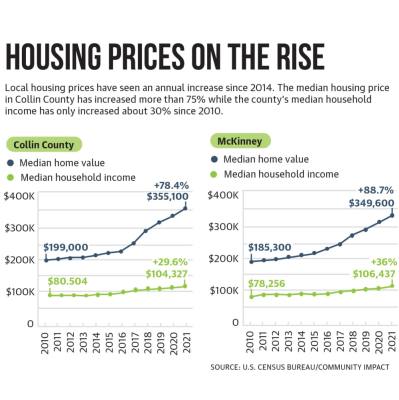The first assessment, completed by Root Policy Research in 2020, assessed the city’s housing stock and the availability of affordable housing.
The study identified four top housing needs in McKinney, including more affordable rentals for residents earning less than $35,000; starter homes and workforce housing priced at or below $200,000; increased housing product diversity; and strategic redevelopment and community improvements.
“The study by Root Policy [Research] has been ... the foundational data that we’ve always shared with council [members] to help them make their decisions on how they want to handle affordable housing,” Assistant City Manager Kim Flom said.
Updated housing information is expected to be ready later this year, said Janay Tieken,housing and community development director.
“The council’s fully aware that since 2020, our average housing price has gone up, and our rental prices have gone up,” Flom said. “When [council members] reviewed their projects, ... they understand that there might be a greater need.”
Council Member Justin Beller, who served six years on the McKinney Housing Authority board, said the needs identified by the study that have yet to be filled include affordable rentals and starter homes that would serve residents whose households make less than the area’s median income of $98,317, according to 2021 census data.
"We have [housing] products that serve households making $60,000 to $90,000 [annually],” Beller said. “We don’t have a lot of products that fall below that.”
Work underway
City leaders and other organizations are part of a collaborative effort led by the McKinney Community Development Corp. to address affordable housing in McKinney.
The group meets quarterly and includes members of city staff, City Council, the McKinney Housing Authority and more, said Cindy Schneible, president of the McKinney Community Development Corp. The group discusses initiatives related to affordable housing and is also considering future collaborative projects, Schneible said.
“The feeling was if we could get people together, understand what’s going on ... we can advance resolution or at least begin to address the issue of affordable housing in the community,” Schneible said.
The group includes Celeste Cox, the chief executive officer of Habitat for Humanity Collin County. The organization, based in east McKinney, builds affordable homes that are sold to qualified low-income applicants.
Navy veteran Marion McFarland, a Louisiana native who has called Texas home since 2008, has struggled with housing insecurity for years, she said. However, that will change by the end of the year when her new home, the 100th Habitat for Humanity Collin County home built in McKinney, is complete.
“It’s a blessing,” she said of working with Habitat for Humanity. “We are all very excited. You know, I just can’t stop smiling whenever I think about it. ... It was like a dream to even get here.”
McFarland and her family have lived in apartments and motels, and used rental assistance programs and pursued housing vouchers during their search for stable housing.
“Having something to call our own is going to feel great,” McFarland said in a news release. “My kids have been waiting since childhood for a house of their own.”
While affordable housing projects by private developers and organizations are underway across the city, Habitat for Humanity Collin County is working toward adding more affordable options for qualified prospective homeowners.
“Housing is getting more expensive to build, so we have to raise a whole lot more money to serve a family than we used to,” Cox said.
Building solutions
The Cotton Groves, a Habitat for Humanity project, will see its first units completed this year, Cox said. The development’s first phase will feature 35 townhomes built from shipping containers as well as amenities.
The project was developed as an affordable housing solution for low- to moderate-income families who qualify for the Habitat for Humanity program, according to a news release.
The McKinney Housing Authority staff are working on a $35.9 million project to redevelop the city’s last remaining public housing units, the Lloyd-Owens and Cockrell Homes.
The redevelopment will add 46 units between the two properties, bringing the total to 96 units.
“We have a waiting list, so there is no end to people knocking at our door,” said Roslyn Miller, the executive director of the McKinney Housing Authority. “We can’t serve everybody on our waiting list because we don’t have the funding available.“
Despite the various affordability-focused projects underway, not all of McKinney’s housing needs are being met, including starter homes and ownership products, Beller said.
“We’ve got to figure out a better way ... to provide a better kind of [housing] stock offering to people so that we are able to create a sustainable housing selection for the lifetime of McKinney, not just right now,” Beller said.
Creating resources
As the need to expand the city’s housing stock variety grows, city staff are turning to existing programs and newly established resources.
One way city officials are addressing housing affordability is through the McKinney Housing Finance Corp., a public nonprofit corporation that is used by the city to codevelop affordable housing projects, Flom said. The corporation is a “powerful tool” in creating affordable housing because it is funded by money from residential developers in exchange for property tax exemptions on affordable housing projects, she said.
“We don’t have a ton of money in there yet but as we enter into more partnership deals, funding will go into that account that can be used at the [McKinney Housing Finance Corp.’s] and council’s discretion to address things like missing middle housing,” Flom said.
A recently finalized Neighborhood Preservation Plan that considered housing in McKinney’s historic east side neighborhoods also recommended establishing a community land trust. This would allow the city to purchase and hold land and existing homes to create affordable housing.
City staff is considering the possibility of using the funds to purchase infill land and build single-family homes that would allow the residents to build equity through the community land trust model, Tieken said.
“We, frankly, are still researching it, but that’s kind of where we’re going with it to just get it started,” Tieken said. “Purchase some lots, build some houses, and get them to folks that need affordable single-family homes.”
City Council has not yet used the $1 million in funding that was allotted to the community land trust in 2022.
“We’ve got lots of tools; we’ve got to figure out how we can best use them,” Beller said of the city’s programs. “We can budget for them but until we have the products created, or some sort of programs created, it’s hard to say, ‘Give us more money to spend.’”








